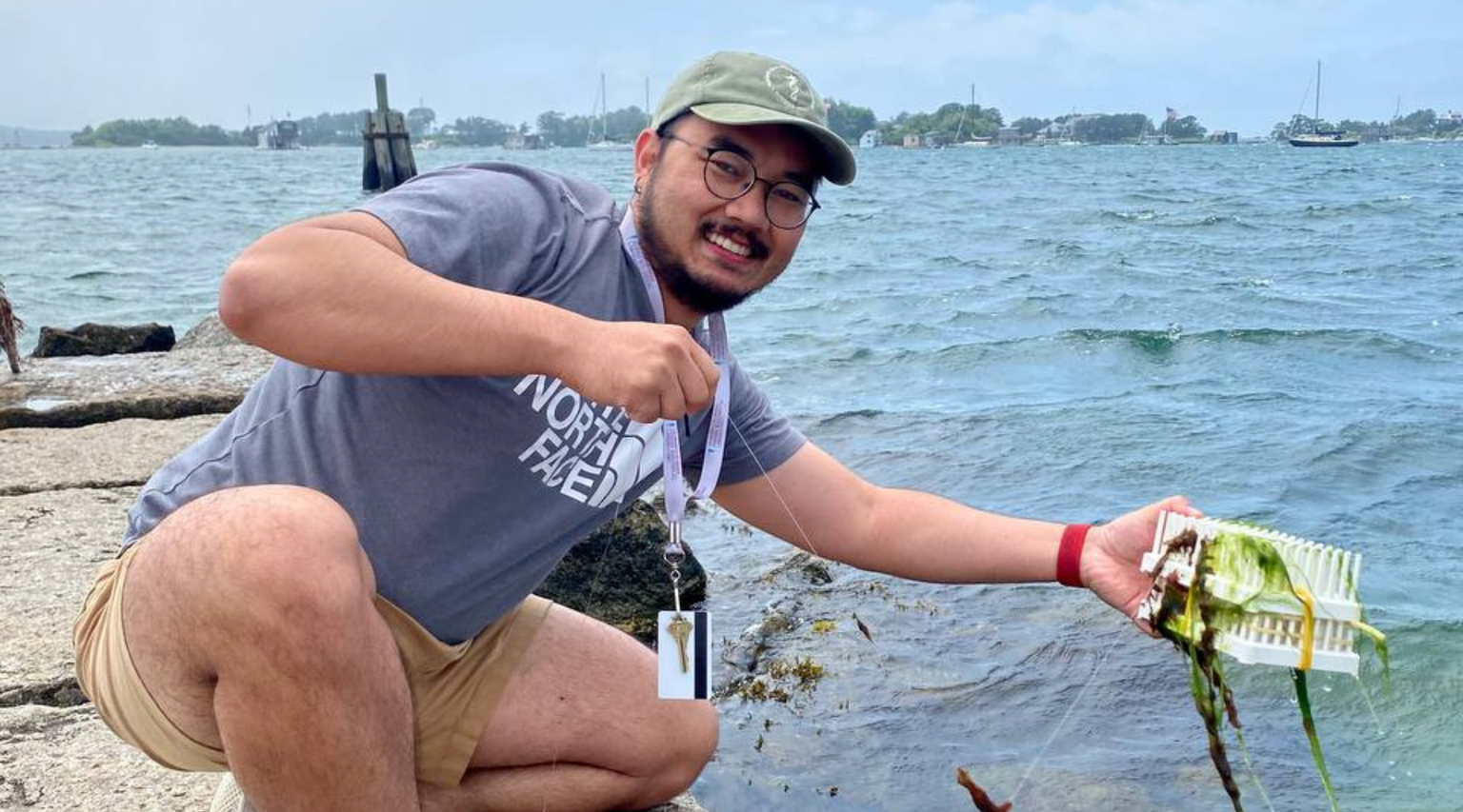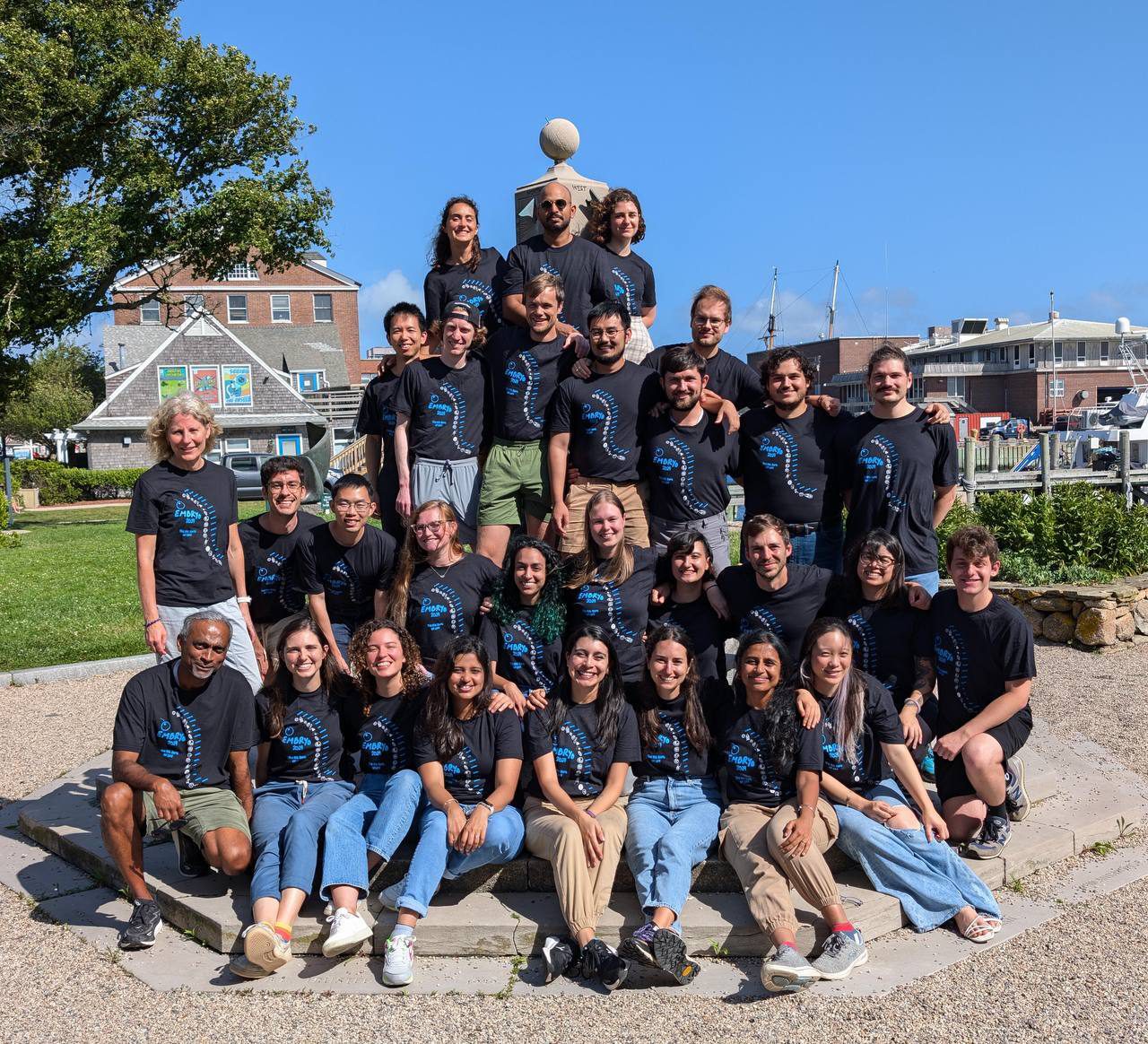News

18 December 2025
Plants, proteins, and new possibilities for antibiotics and agriculture
Stowers scientist discovers insights into how plants “talk” to bacteria in soil, possibly informing future antimicrobial therapies
Read Article
News
Q&A with Ekasit Sonpho, Postdoctoral Research Associate in the Sánchez Alvarado Lab

What is your research focus in the Sánchez Alvarado Lab?
In the Sánchez Alvarado Lab, we are interested in regeneration biology, leveraging various research organisms such as planarian flatworms, apple snails, and killifish. I am particularly interested in planarians, which are tiny freshwater flatworms that possess incredible tissue regeneration capabilities. If you cut a tiny portion from a planarian’s tail, that fragment can regenerate an entire body! This offers us an extraordinary platform to study stem cell biology.
Many researchers have focused on the complex processes occurring within stem cells called neoblasts, which are the only source of proliferating cells in the planarian body and are essential for planarian physiology.
However, my research focuses on something beyond the cellular compartment. I am interested in connective tissue, which serves as the microenvironment surrounding all cells in planarians, including neoblasts. The tissue physically connecting cells has been shown to regulate the stem cell microenvironment, significantly impacting stem cell activity in many vertebrate models. But the way in which it regulates highly pluripotent stem cells, like those in planarians, is not yet fully understood.
What motivated you to attend the MBL Embryology course?
The Embryology course at the MBL is world-renowned. Ever since becoming a postdoc at the Stowers Institute in 2021, I have wanted to attend. However, I held off, to allow myself time to better establish my postdoc research program; having a clear research plan allows me to truly know what ideas and concepts I would be looking to enhance at the MBL.
I finally applied in 2024 as I was entering the senior phase of my postdoc training. I knew I needed hands-on experience working with different research organisms. These skills are essential for my future career plans as a Principal Investigator. Being exposed to diverse research organisms throughout the course impacted the direction of my current project.

2024 Embryology course participants and Course Directors, Tatjana Piotrowski, PhD, and Athula Wikramanayake, PhD
Could you share one or two key takeaways from your experience at the MBL Embryology course that have influenced your research or perspective?
First, always choose the right research organism for the right scientific question. Do not force yourself to work solely with one particular organism if it does not provide answers to your significant biological questions. Each organism has its own unique traits. Posing the right question for the right organism will accelerate your research progress and provide you with timeless questions that you could spend your whole career pursuing.
Secondly, never underestimate the power of a “dirty” experiment. By a “dirty” experiment, I mean those that are highly curiosity-driven, with minimal preparation and almost spontaneous execution, often accompanied by a high failure rate. Before attending the course, I always stuck to well-planned experiments with high success rates because I believed unplanned experiments were useless and wasteful. However, my perspective changed when I saw my classmates combining bizarre ideas and jumping into experiments after just a 10 minute discussion.
Most of the time, the results were failures, but occasionally, an experiment turned out to be extremely intriguing! I was surprised by the outcomes of colleagues’ efforts and began to understand the importance of dirty experiments: to be bold, fearless, and willing to try your craziest ideas without worrying about the outcome. The chance of failure is high, but this reminds me of how many dirty experiments in the past have eventually led to life-changing discoveries.
In what ways do you think the knowledge and skills gained from the course will impact your future research projects?
I learned a great deal about developmental biology and embryology, especially through hands-on experiments. The instructors often demonstrated how to work with different organisms or carry out tricky experiments. As a result, I gained much knowledge on how to handle, maintain, and perform simple experiments on various research organisms. Although more knowledge might be needed for performing complicated experiments, it gives you a sense of how it would work with a particular animal.
I also learned how to work within a team. Usually, I prefer to work alone since it is easier for me to make decisions and execute experiments. However, I found that creativity can flourish within a team. When you combine individual areas of expertise. For example, I worked with a student whose focus was biophysics and computational modeling. Observing her conducting various computational analyses and approaching problems through the lens of a biophysicist inspired me enormously. It encouraged me to rethink my current project perspective toward improving its quality.
Were there any experiments or techniques learned at MBL that you're excited to apply in your work at the Stowers Institute?
One topic I am always interested in is how mechanical signals are transduced to regulate cellular behavior. The fact that the planarian flatworm is a very squishy organism and that about 15% of its cells are stem cells makes it an attractive model for studying mechanotransduction—how mechanical forces like pressure and strain are converted to cellular signals— in stem cells and tissue regeneration. Coincidentally, one of the modules in the Embryology course focused on frogs (Xenopus laevis) and included a biomechanics session where instructors taught us how to use a handmade system called micropipette aspiration to measure the mechanical stiffness of Xenopus embryos. Initially, I was skeptical about the whole thing, as the handmade system looked quite toyish. To my great surprise, this system worked flawlessly and started providing very interesting data, allowing us to estimate Young’s modulus—the stiffness of solid material subjected to force—of Xenopus embryos at different stages and anatomical positions. I was genuinely shocked and thrilled to take this knowledge back to the Institute and test it with my planarians. I even brought the micropipette aspiration setup back with me, signed by my classmates with the hope that it would someday stand in a glass box in my future office as a PI!
What advice would you give to other postdocs (or anyone) considering attending the Embryology course?
If you are interested in developmental biology, have never been exposed to different types of research organisms, or feel that your perspective on research organisms is limited, I suggest considering it. This course requires a ton of dedication and focus. However, the time you invest is worth the benefits you gain, such as exposure to a variety of research organisms and the development of many skills you might not usually have the chance to practice. Examples of skills I acquired during the course include team building, scientific communication, professional networking, and enhancing creativity and originality.
Secondly, it would be dishonest to say that no one has ever felt lost during their postdoc journey, and I am no exception. The opportunity to become familiar with the diverse organisms encountered throughout the course, clarified any doubts about what I truly want to pursue as a scientist.
Finally, this course is a reminder that you must keep learning and never stop. There are so many new things to learn, even from classmates at earlier career stages. It has reminded me of one of Steve Jobs’ most famous quotes: “Stay hungry, stay foolish.”

Woods Hole, MA
What do you love most about the MBL and the town of Woods Hole?
Working at the Stowers Institute in Kansas City for almost three years has made me appreciate the quiet and peaceful nature of Woods Hole, a very small and tranquil town, which means there are very few distractions to keep me away from science. Additionally, Woods Hole has incredible natural places to visit, such as beaches, hiking trails, and ocean fronts.
News

18 December 2025
Stowers scientist discovers insights into how plants “talk” to bacteria in soil, possibly informing future antimicrobial therapies
Read Article
News

17 December 2025
Explore 15 highlights from 2025 at the Stowers Institute: New scientists, impactful discoveries, and a milestone moment.
Read Article
News
08 December 2025
Craig Venter, Ph.D., founder of the J. Craig Venter Institute, joined Alejandro Sánchez Alvarado, Ph.D., for an evening of reflection and conversation surrounding his scientific journey.
Read Article
